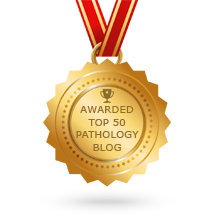The patient is a 15 year old boy returning from swimming camp, who presents with several-day history of profuse watery diarrhea. A stool specimen was submitted for parasite examination, and multiple small (3-6 µm), round structures were identified. The following photos are taken after:
2. Negative fuchsine staining according to Heine (phase-contrast microscopy)
Identification?






9 comments:
Cryptosporidium spp., oocisti.
Cryptosporidium oocyst
Cryptosporidium
The negative stain is pretty cool Idzi, the oocysts stand out clearly against the background. From the previous comments, we clearly see that everyone called them Cryptosporidium spp. and not parvum since more than one species of Cryptosporidium can cause diarrhea to humans. Certainly the Direct Fluorescent Antibody does have its clinical value but when a suspected case does not fluoresce we need to confirm with the acid fast stain. Even so, we must keep in mind the truth that coccidian oocysts stain variably acid fast and some may appear as an empty hole with a ground glass interior.
Florida Fan
Cryptosporidium
Back in the day when I was still a wee baby, I came down with a severe case of watery diarrhea that couldn't be diagnosed or stopped. My parents and physician thought I was a goner but I managed to stick around. Fast forward to my years as a diagnostician, I was exposed to innumerable oocysts of Cryptosporidium spp. over 30 years, but never became infected. Did I acquire immunity from a past exposure?
Cryptosporidium spp based on the morphology and size on modified ZN staining. I cannot identify it at phase contrast microscope
Agree Crypto. So there is only one in the first photo, three in the second (round white circles)?
Oocytes of Cryptosporidium species based on Cold ZN
Post a Comment